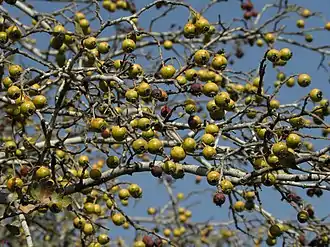زعرور
Arabic

Alternative forms
- عُزْرُور (ʕuzrūr), عَزْرُور (ʕazrūr)
Etymology
Borrowed from Aramaic, there with forms as עוזררא, אנזעררתא, זרדתא, זרתא, זודתא, זירדתא, אוזר, חוזרר, חזרור, חיזרר, ܥܙܪܪܬܐ. Perhaps from an Egyptian expression like Sahidic Coptic ⲥⲟⲩⲣⲉ ⲁⲣⲟⲟⲩⲉ (soure arooue, literally “needle-thistle”), which would explain the distribution of similar Ancient Greek μέσπιλον (méspilon, “medlar”), Moroccan Arabic مزاح (mzāḥ, “loquats, medlars”), Proto-Kartvelian *sxmarṭl- (“medlar”), Middle Armenian զկեռ (zkeṙ, “medlar”), Persian ازگیل (azgil, “medlar”), Georgian ასკილი (asḳili, “dog rose, briar”). However as the speech is of pomefruits, the form חֲזְרוּרָא (ḥăzrūrā) may be most original and reduplicated from the known term ܚܙܘܪܐ / חֲזוּרָא (ḥăzzūrā, “apple”).
Noun
زُعْرُور or زَعْرُور • (zuʕrūr or zaʕrūr) m (collective, singulative زُعْرُورَة f (zuʕrūra) or زَعْرُورَة (zaʕrūra))
- thornapple, medlar (Crataegus gen. et spp., fruit and tree)
Declension
| Collective | basic collective triptote | ||
|---|---|---|---|
| Indefinite | Definite | Construct | |
| Informal | زُعْرُور; زَعْرُور zuʕrūr; zaʕrūr |
الزُّعْرُور; الزَّعْرُور az-zuʕrūr; az-zaʕrūr |
زُعْرُور; زَعْرُور zuʕrūr; zaʕrūr |
| Nominative | زُعْرُورٌ; زَعْرُورٌ zuʕrūrun; zaʕrūrun |
الزُّعْرُورُ; الزَّعْرُورُ az-zuʕrūru; az-zaʕrūru |
زُعْرُورُ; زَعْرُورُ zuʕrūru; zaʕrūru |
| Accusative | زُعْرُورًا; زَعْرُورًا zuʕrūran; zaʕrūran |
الزُّعْرُورَ; الزَّعْرُورَ az-zuʕrūra; az-zaʕrūra |
زُعْرُورَ; زَعْرُورَ zuʕrūra; zaʕrūra |
| Genitive | زُعْرُورٍ; زَعْرُورٍ zuʕrūrin; zaʕrūrin |
الزُّعْرُورِ; الزَّعْرُورِ az-zuʕrūri; az-zaʕrūri |
زُعْرُورِ; زَعْرُورِ zuʕrūri; zaʕrūri |
| Singulative | singulative triptote in ـَة (-a) | ||
| Indefinite | Definite | Construct | |
| Informal | زُعْرُورَة; زَعْرُورَة zuʕrūra; zaʕrūra |
الزُّعْرُورَة; الزَّعْرُورَة az-zuʕrūra; az-zaʕrūra |
زُعْرُورَة; زَعْرُورَة zuʕrūrat; zaʕrūrat |
| Nominative | زُعْرُورَةٌ; زَعْرُورَةٌ zuʕrūratun; zaʕrūratun |
الزُّعْرُورَةُ; الزَّعْرُورَةُ az-zuʕrūratu; az-zaʕrūratu |
زُعْرُورَةُ; زَعْرُورَةُ zuʕrūratu; zaʕrūratu |
| Accusative | زُعْرُورَةً; زَعْرُورَةً zuʕrūratan; zaʕrūratan |
الزُّعْرُورَةَ; الزَّعْرُورَةَ az-zuʕrūrata; az-zaʕrūrata |
زُعْرُورَةَ; زَعْرُورَةَ zuʕrūrata; zaʕrūrata |
| Genitive | زُعْرُورَةٍ; زَعْرُورَةٍ zuʕrūratin; zaʕrūratin |
الزُّعْرُورَةِ; الزَّعْرُورَةِ az-zuʕrūrati; az-zaʕrūrati |
زُعْرُورَةِ; زَعْرُورَةِ zuʕrūrati; zaʕrūrati |
| Dual | Indefinite | Definite | Construct |
| Informal | زُعْرُورَتَيْن; زَعْرُورَتَيْن zuʕrūratayn; zaʕrūratayn |
الزُّعْرُورَتَيْن; الزَّعْرُورَتَيْن az-zuʕrūratayn; az-zaʕrūratayn |
زُعْرُورَتَيْ; زَعْرُورَتَيْ zuʕrūratay; zaʕrūratay |
| Nominative | زُعْرُورَتَانِ; زَعْرُورَتَانِ zuʕrūratāni; zaʕrūratāni |
الزُّعْرُورَتَانِ; الزَّعْرُورَتَانِ az-zuʕrūratāni; az-zaʕrūratāni |
زُعْرُورَتَا; زَعْرُورَتَا zuʕrūratā; zaʕrūratā |
| Accusative | زُعْرُورَتَيْنِ; زَعْرُورَتَيْنِ zuʕrūratayni; zaʕrūratayni |
الزُّعْرُورَتَيْنِ; الزَّعْرُورَتَيْنِ az-zuʕrūratayni; az-zaʕrūratayni |
زُعْرُورَتَيْ; زَعْرُورَتَيْ zuʕrūratay; zaʕrūratay |
| Genitive | زُعْرُورَتَيْنِ; زَعْرُورَتَيْنِ zuʕrūratayni; zaʕrūratayni |
الزُّعْرُورَتَيْنِ; الزَّعْرُورَتَيْنِ az-zuʕrūratayni; az-zaʕrūratayni |
زُعْرُورَتَيْ; زَعْرُورَتَيْ zuʕrūratay; zaʕrūratay |
| Paucal (3-10) | sound feminine paucal | ||
| Indefinite | Definite | Construct | |
| Informal | زُعْرُورَات; زَعْرُورَات zuʕrūrāt; zaʕrūrāt |
الزُّعْرُورَات; الزَّعْرُورَات az-zuʕrūrāt; az-zaʕrūrāt |
زُعْرُورَات; زَعْرُورَات zuʕrūrāt; zaʕrūrāt |
| Nominative | زُعْرُورَاتٌ; زَعْرُورَاتٌ zuʕrūrātun; zaʕrūrātun |
الزُّعْرُورَاتُ; الزَّعْرُورَاتُ az-zuʕrūrātu; az-zaʕrūrātu |
زُعْرُورَاتُ; زَعْرُورَاتُ zuʕrūrātu; zaʕrūrātu |
| Accusative | زُعْرُورَاتٍ; زَعْرُورَاتٍ zuʕrūrātin; zaʕrūrātin |
الزُّعْرُورَاتِ; الزَّعْرُورَاتِ az-zuʕrūrāti; az-zaʕrūrāti |
زُعْرُورَاتِ; زَعْرُورَاتِ zuʕrūrāti; zaʕrūrāti |
| Genitive | زُعْرُورَاتٍ; زَعْرُورَاتٍ zuʕrūrātin; zaʕrūrātin |
الزُّعْرُورَاتِ; الزَّعْرُورَاتِ az-zuʕrūrāti; az-zaʕrūrāti |
زُعْرُورَاتِ; زَعْرُورَاتِ zuʕrūrāti; zaʕrūrāti |
Descendants
- → Catalan: atzerolo, atzerola
- ⇒ Catalan: atzeroler, atzerolera
- → Galician: azarolo
- → Latin: azarolus
- → Spanish: acerolo, acerola
- ⇒ Spanish: azarolla
- ⇒ Spanish: cerollo (possibly)
- → French: azerole
- → Bulgarian: ацеро́ла (aceróla)
- → French: acérola
- → German: Acerola
- → Greek: ασερόλα (aseróla)
- → Italian: acerola
- → Polish: acerola
- → Russian: ацеро́ла (aceróla)
- → Serbo-Croatian: acerola
- → Slovene: acerola
- → Ukrainian: ацеро́ла (aceróla)
- → Portuguese: acerolo, acerola
References
 زعرور on the Arabic Wikipedia.Wikipedia ar
زعرور on the Arabic Wikipedia.Wikipedia ar- “ˁzrrh”, in The Comprehensive Aramaic Lexicon Project, Cincinnati: Hebrew Union College, 1986–
- Corriente, Federico; Pereira, Christophe; Vicente, Angeles, editors (2017) Dictionnaire du faisceau dialectal arabe andalou. Perspectives phraséologiques et étymologiques (in French), Berlin: De Gruyter, page 586
- Crum, Walter E. (1939), “ⲥⲟⲩⲣⲉ”, in A Coptic Dictionary, Oxford: Clarendon Press, →ISBN, page 354a
- Fraenkel, Siegmund (1886) Die aramäischen Fremdwörter im Arabischen (in German), Leiden: E. J. Brill, page 142
- Freytag, Georg (1833), “زعرور”, in Lexicon arabico-latinum praesertim ex Djeuharii Firuzabadiique et aliorum Arabum operibus adhibitis Golii quoque et aliorum libris confectum (in Latin), volume 2, Halle: C. A. Schwetschke, page 237
- Lane, Edward William (1863), “زعرور”, in Arabic-English Lexicon, London: Williams & Norgate, page 1231
- Löw, Immanuel (1881) Aramæische Pflanzennamen (in German), Leipzig: Wilhelm Engelmann, pages 283–289
- Löw, Immanuel (1924) Die Flora der Juden (in German), volume 3, Wien und Leipzig: R. Löwit, pages 244–256
- Steingass, Francis Joseph (1884), “زعرور”, in The Student's Arabic–English Dictionary, London: W.H. Allen, page 456
- Wehr, Hans; Kropfitsch, Lorenz (1985), “زعرور”, in Arabisches Wörterbuch für die Schriftsprache der Gegenwart (in German), 5th edition, Wiesbaden: Otto Harrassowitz, published 2011, →ISBN, page 523